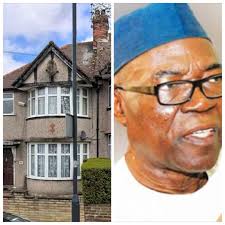Uncategorized
Cerebrospinal Meningitis: NCDC Records 4915 Suspected Cases, 361 Deaths Across 174 LGAs

From Lateef Taiwo
The Nigeria Centre for Disease Control and Prevention (NCDC) reports that, as of 2023/2024, Nigeria experienced 4915 suspected cases, 380 confirmed cases, and 361 deaths from Cerebrospinal Meningitis, CSM, across 174 Local Government Areas in 24 States including the Federal Capital Territory.
Director General, Nigeria Centre for Disease Control and Prevention, Dr Jide Idris made this known at a press briefing that a total of 2, 281, 750 doses of Men5CV- ACWYX in Bauchi, Gombe, Jigawa and Yobe covering 134 wards in the 13 LGAs. The campaign targeted individuals aged 1-29years, comprising 70% of the population.
He said, despite significant progress in surveillance, diagnostic capacity, and vaccination over the last few years, CSM remains a priority disease and ever-present public health threat in Nigeria with annual outbreaks in high-burden states that present a challenge for people, health systems, economies, and communities.
He informed that cerebrospinal Meningitis, CSM, occurs when there is an acute inflammation of the covering of the brain and the spinal cord. This inflammation can be caused by infection with any of the following organisms – bacteria, viruses, parasites, or fungi. Injuries and certain drugs can also cause such inflammation.
The DG explained, “CSM is an epidemic-prone disease with cases reported all year round in Nigeria. However, weather conditions like the dry season that comes with dust, winds, cold nights, and frequent upper respiratory tract infections increase the risk of infection, especially with crowding and poor ventilation. The highest burden of CSM in Nigeria occurs in the “Meningitis Belt” which includes all 19 states in the Northern region, the Federal Capital Territory (FCT), and some southern states such as Bayelsa, Cross River, Delta, Ekiti, Ogun, Ondo, Osun).
He noted, while the agency continue to intensify efforts using an all-of-society approach, the public is advised to note that the virus spreads through direct person-to-person contact, including droplets from the nose and throat of infected persons.
“Close and prolonged contact with an infected individual, saying CSM initially presents with fever, headache, nausea and vomiting, photophobia (pain on looking at bright lights), neck stiffness, and altered conscious levels. It may be more difficult to observe these signs in younger children, but irritability, poor feeding, and inactivity are common.
“Although meningitis affects all ages, the most at-risk persons are: Young children, especially those under or not immunised, Individuals living in overcrowded households, Individuals who smoke, Individuals exposed due to poor ventilation and indoor air pollution from cooking with wood, or charcoal, those with poor hygienic practices (poor cough etiquette and hand washing for example).
He urged the general public to ensure loved loved ones have received the appropriate vaccination required to protect against meningitis, avoid close and prolonged contact with a confirmed case of CSM including relatives, avoid overcrowding on households, schools dormitories, IDPs, prisons other communal settings, practice proper respiratory hygiene when coughing or sneezing and discourage indoor air pollution, such as indoor cooking over open flames.
“Healthcare workers are advised always to practice standard infection prevention and control practices: i.e., wear gloves and other appropriate personal protective equipment while handling patients or providing care to an ill patient
Uncategorized
London Property Dispute Exposes Alleged Corruption, Forgery by Nigerian Politician and Lawyer

By Hassan Taiye
A recent judgment by the UK’s First-tier Tribunal (Property Chamber) has shed light on a complex web of alleged corruption and forgery involving a Nigerian politician and a senior lawyer. The case revolves around a disputed property in North London, valued at 79 Randall Avenue.
The property was purchased in 1993 under the name “Tali Shani,” which is allegedly an alias for late General Jeremiah Useni, a powerful member of the Abacha regime. Chief Mike Ozekhome, SAN, claimed the property was gifted to him by “Mr. Tali Shani” in 2021 as payment for legal services. However, the tribunal dismissed this claim, describing it as “fabricated” and “fraudulent.”
The tribunal’s ruling highlights the alleged involvement of Ozekhome and his associates in fabricating documents, including a Nigerian passport, National Identification Number (NIN), and Tax Identification Number (TIN). The NIN was reportedly created remotely from Monaco using a non-compliant photograph and bypassing biometric requirements ¹.
The Human and Environmental Development Agenda (HEDA Resource Centre) has petitioned the Independent Corrupt Practices and Other Related Offences Commission (ICPC) to investigate Ozekhome and others over alleged fraud, forgery, and unlawful attempt to acquire the London property. The ICPC has launched an investigation, and the Attorney-General of the Federation (AGF) has also taken notice of the case ²
Chief Mike Ozekhome, SAN Senior lawyer accused of forgery and attempting to acquire the property through fraudulent means.
General Jeremiah Useni Late Nigerian General allegedly behind the purchase of the property under the alias “Tali Shani.”
Osilama Ozekhome*: Ozekhome’s son, implicated in the alleged forgery and fraud.
Uncategorized
photo

L-r Senate Committee Chairman on Appropriation, Solomon Adeola; Senate Deputy Whip, Onyekachi Nweboyin; Former Senate President, Ahmad Lawan; President of the Senate, Godswill Akpabio; Senator Sharafadeen Ali; Deputy Senate President, Jibrin Barau; Senate Leader, Opeyemi Bamidele; Senate Whip Tahir Monguno and Senate Committee Chairman on Financial Institutions, Tokunbo Abiru, after resumption of plenary yesterday. Photo: Senate President’s Office
Uncategorized
BREAKING: Tinubu’s Minister, Uche Nnaji, Resigns Amid Certificate Forgery Scandal

By: Fabian Apechihin
The Minister of Innovation, Science and Technology, Uche Nnaji, has resigned from President Bola Ahmed Tinubu’s cabinet amid a growing controversy surrounding his academic credentials.
Presidential spokesman Bayo Onanuga confirmed Nnaji’s resignation in a statement issued late Tuesday.
Nnaji’s exit follows mounting allegations that his academic certificates were forged. Investigations revealed that the University of Nigeria, Nsukka (UNN), disowned the Bachelor of Science degree he claimed to possess, stating that he never completed his studies at the institution and was therefore not issued any certificate.
According to UNN Vice-Chancellor Prof. Simon U. Ortuanya, Nnaji was admitted in 1981 but failed to meet the requirements for graduation.
In a related development, the National Youth Service Corps (NYSC) reportedly disowned the certificate of national service presented by Nnaji, describing it as fake.
His resignation marks the latest in a series of controversies to hit the Tinubu administration over questions of integrity and accountability among public officials.
-

 Uncategorized5 years ago
Uncategorized5 years agoFG, states urged to harness flooding for ranching, others with technology – Agbaje
-

 Headlines10 years ago
Headlines10 years agoBreaking: EFCC seals Borno House of Assembly, as Hon members take to their heels
-

 News11 years ago
News11 years agoNigeria Security Operatives Stage Manhunt For Homosexual Perpetrator
-

 News9 years ago
News9 years agoHow 21-year-old Girl fled community over accusation of lesbianism
-

 News10 years ago
News10 years agoYobe Gov Moves Against Deputy
-

 Opinion6 years ago
Opinion6 years ago7 signs she has friend zoned you
-
Technology4 years ago
Online job placement company headhunts women
-

 Headlines9 years ago
Headlines9 years agoBorno Dep Gov Abducts Another Church Leader





